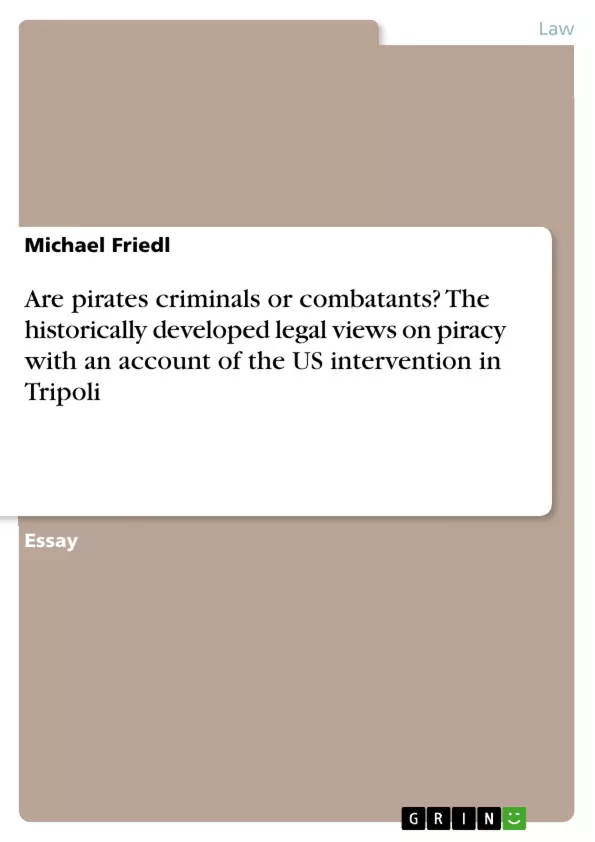An essay about the legal views on piracy through the history of law, starting with Ancient Greece. Written with regard of the takes of legal scholars of several centuries and special consideration of the US invasion against the so called Barbary States in Northern Africa. Closing with the reason for why the question of how to assess acts of piracy could become more important in these times.
Inhaltsverzeichnis (Table of Contents)
- Pirates - Criminals or Combatants
- The Roman Era
- The Roman Republic
- The Roman Empire
- The Early Modern Era
- State-Sponsored Piracy
- The Barbary States
Zielsetzung und Themenschwerpunkte (Objectives and Key Themes)
This essay examines the historical development of legal perspectives on piracy, focusing specifically on the legal status of pirates and the complexities of distinguishing between criminal and legitimate acts of sea robbery. It explores the evolution of international law regarding piracy, highlighting the role of state-sanctioned piracy, and analyzing the challenges of defining and enforcing piracy regulations.
- The historical development of legal views on piracy
- The distinction between criminal piracy and legitimate sea robbery
- The role of state-sanctioned piracy in international law
- The challenges of defining and enforcing piracy regulations
- The impact of piracy on international relations and maritime trade
Zusammenfassung der Kapitel (Chapter Summaries)
- This chapter introduces the concept of piracy and its historical context. It explores the use of the term "pirate" in various historical contexts and discusses the overlapping concept of armed robbery at sea. The chapter also examines the early forms of state-sanctioned piracy, exemplified by the practices of the people of Chalcedon.
- This chapter focuses on the Roman era and its perspective on piracy. It examines the Roman's use of slave trade and their use of the term "enemy of all" in relation to certain maritime powers. The chapter also recounts the capture of Julius Caesar by pirates and the subsequent Roman efforts to combat piracy in the Mediterranean.
- This chapter delves into the emergence of state-sponsored piracy in the early modern era. It explores the practice of employing "freebooters" by states, such as the case of Sir Francis Drake. The chapter further analyzes the distinction between legitimate "privateers" and criminal pirates, and discusses the complexities of legalizing acts of violence through state authorization.
- This chapter focuses on the Barbary States, their involvement in piracy, and their interactions with European powers. It examines the "Barbary Treaties" and explores the complexities of recognizing non-European states as subjects of international law. The chapter also highlights the debates concerning the application of Roman legal concepts, like "Postliminium," to non-Christian regimes.
Schlüsselwörter (Keywords)
This essay focuses on piracy, international law, maritime history, state-sanctioned piracy, privateers, Barbary States, and the legal distinction between criminal and legitimate acts of sea robbery. The text delves into the historical evolution of legal perspectives on piracy, examining the challenges of enforcing regulations and defining the legal status of pirates. It explores the impact of piracy on international relations and maritime trade, while analyzing the complexities of state authorization and the evolving recognition of non-European states as subjects of international law.
- Citation du texte
- Michael Friedl (Auteur), 2015, Are pirates criminals or combatants? The historically developed legal views on piracy with an account of the US intervention in Tripoli, Munich, GRIN Verlag, https://www.grin.com/document/317886



